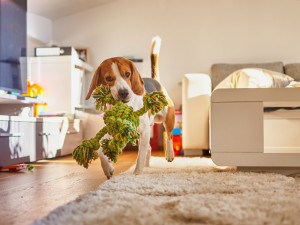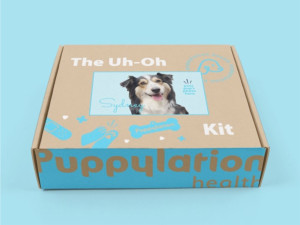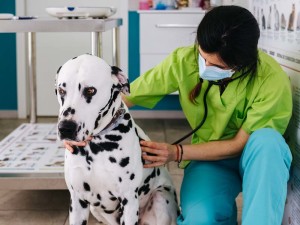Why Does My Dog Throw Up Yellow Bile?
It’s not a pretty sight, but it’s important to know what’s going on.

Share Article
In This Article:
What Is Bile? What Is Causing Your Dog to Throw Up Yellow Bile? When to Visit the Vet Frequently Asked Questions
Dogs may vomit yellow bile due to an empty stomach causing irritation from acid buildup. This can occur when they haven’t eaten for a while or have eaten something upsetting. Veterinary evaluation is recommended to address any underlying health concerns.
What is bile?
Bile is a yellow to greenish liquid that helps with digestion. It is made by the liver, stored in the gallbladder, and released into the small intestines as needed. Bile is triggered to be released into the digestive tract when food that contains fat leaves the stomach and enters the small intestines. Its important roles include:
Breaking down fat into fatty acids
Aiding with absorption of fatty acids and fat-soluble vitamins
Eliminating excess cholesterol
Neutralizing the acid leaving the stomach
Fighting off bad bacteria in the gut

What is causing your dog to throw up yellow bile?
When a dog vomits bile, the cause can range from mild stomach upset to severe chronic disease.
Common reasons for dogs to vomit bile include:
Bilious vomiting syndrome
Bilious vomiting syndrome in dogs is a condition in which dogs vomit yellow bile (or sometimes just foam) after going without food for an extended period of time. For many dogs with bilious vomiting syndrome, that period is the time between dinner and breakfast. By morning, dogs may be nauseated, drooling, or even have a poor appetite. These dogs are thought to develop bile reflux overnight, meaning some of that yellow substance in their small intestines has flowed backwards into their stomach, causing nausea and vomiting.
Gastrointestinal disease
Gastrointestinal disease in dogs can range in severity from temporary stomach upset to chronic conditions like inflammatory bowel disease. Dogs may experience mild to moderate stomach upset from a new diet, certain table foods, or random items they come across.
If dogs ingest spoiled food, bacteria can trigger inflammation that causes vomiting and/or diarrhea. If vomiting persists after the stomach has emptied, dogs can still expel yellow bile.
Pancreatitis
The pancreas is a digestive organ attached to the intestines and tucked between the stomach and liver. It releases enzymes and hormones that aid in digestion and help regulate blood sugar. Pancreatitis is inflammation of the pancreas and can develop after dogs eat a rich or fatty food, or for no apparent reason. Symptoms of pancreatitis include vomiting, diarrhea, nausea, and abdominal pain.
Gastrointestinal obstruction
Gastrointestinal obstruction can occur when foreign objects (like socks or toys) or abnormal tissue growth (tumors) block the passage of material through the intestinal tract. Although the material is unable to move forward, digestive fluid is still produced and builds up in the stomach and intestines.
With no way forward, this material will flow backwards, leading to uncontrollable vomiting. Vomit associated with intestinal obstruction is often greenish due to the build up of bile in the fluid. Surgery is often needed to resolve the obstruction. Left untreated, obstructions can lead to serious complications and infections.
Food allergies and Intolerance
Dogs with food allergies experience an immune-mediated reaction to specific proteins in their food. Common allergens for dogs include chicken and beef. Dogs with food allergies usually develop skin issues like itching, redness, and flaking, but vomiting and diarrhea can also occur.
Unlike allergies, there is no immune component to food intolerances. Instead, a dog’s GI tract struggles to digest certain components in their food, leading to vomiting, diarrhea, and gas. A common form of this is indigestion associated with lactose intolerance.
Systemic disease
While vomiting is a common complaint in dogs, it doesn't necessarily point to a digestive issue.Dogs can vomit from organ dysfunction like kidney or liver disease or endocrine diseases like hypoadrenocorticism (Addison’s disease). Because vomiting can have many causes, veterinarians often recommend diagnostic tests like blood work and X-rays to try to pinpoint the underlying issue.
When to visit the vet
One episode of vomiting bile shouldn’t prompt dog parents to panic, especially if their dog is doing fine otherwise. But dog parents should keep a watchful eye because the list of things that can cause vomiting is so long. Some causes of vomiting are considered medical emergencies, so get your pup to the vet if you see these signs:
Multiple episodes of vomiting in a short period of time
Regular vomiting over a long period of time (like most mornings)
Pain
Lethargy
Multiple bouts of diarrhea
Anorexia
Inability to hold down food or water
Abdominal swelling
Your veterinarian will start by taking a medical history. Be upfront about any potential culprits, like missing toys or recent table scraps. Physical examination can help assess general hydration and check for abdominal pain. Diagnostic testing is often recommended to narrow down possible causes of vomiting.
Blood work can reveal signs of infection or organ dysfunction. Imaging like radiography or ultrasonography can look for signs of obstruction or tumors. In some cases, more extensive tests like endoscopy (using a camera to look directly inside the gut) or biopsies from the GI tract may be needed to try to get a diagnosis.
Treatment for a dog that’s vomiting bile depends on the cause. Sometimes, just giving a dog’s stomach some time to settle is sufficient. Some dogs may require outpatient treatments like subcutaneous fluids and anti-nausea medication. Intestinal obstructions often require surgical intervention as soon as possible to prevent serious complications. In cases of chronic vomiting, your vet might recommend a food trial to identify potential food allergies or intolerances. Some dogs may require long-term medications and diet restrictions to keep the vomiting under control.
FAQs (People also ask):
Should I be worried if my dog is throwing up yellow bile?
One episode of vomiting bile is usually not too concerning if your dog feels good otherwise. If your dog is vomiting multiple times or has additional symptoms like lethargy or pain, take them to a vet to see what’s up.
How to make a dog feel better after vomiting
Don’t let dogs take in a bunch of food or water right after vomiting. Sometimes this just provides more things to vomit up, which can make your dog feel worse. If your dog vomits repeatedly or feels bad after vomiting, see your vet for treatment.
Is my dog bloated?
Dogs experiencing gastric dilatation and volvulus (GVV), or bloat, will often retch without being able to produce any vomit. They will also have distended, and often painful, abdomens. If you’re concerned about GDV, get your dog to a vet right away.
References:

Dr. Alycia Washington, DVM, MS
Alycia Washington is a small-animal emergency veterinarian with over 10 years of experience based in North Carolina. She works as a relief veterinarianopens in new tab and provides services to numerous emergency and specialty hospitals. She also works as a veterinary writer with a focus on educating pet parents.
Related articles
![Dog in the kitchen with girl making cookies from dough on the counter]()
Raw Dough and Dogs Don’t Mix
Active yeast puts dogs at risk for obstruction and alcohol poisoning.
![Beagle dog fetching a green rope in a dog-proofed living room.]()
How to Dog-Proof Your Home
Our room-to-room guide to get your house in dog-safe shape.
![uh-oh kit for dogs]()
You Need This Customizable, Vet-Designed First Aid Kit for Dogs
Just in case.
![Dalmatian and Great Dane mixed dog at the vet being checked on by a nurse in bright green scrubs]()
Why Is Your Dog’s Stomach Hard? What to Give a Bloated Dog
And when to be concerned.
![black and white dog looking ill laying on couch]()
Warning Signs Your Dog Needs to Go to the ER — Stat
Trust me, I’m a vet.
![White and black spotted Great Dane with two different colored eyes looks into the camera]()
Here’s How You Can Prevent Dangerous Bloat in Your Dog
Bloat is one of the leading causes of death in deep-chested dogs. This elective surgery can lower the risk.









